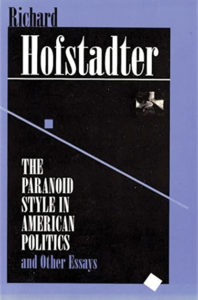Richard Hofstadter: Anti-Intellectualism in American Life, The Paranoid Style in American Politics, Uncollected Essays 1956–1965

EDITED BY SEAN WILENTZ
LIBRARY OF AMERICA, 2020
Conspiracy theories are the last refuge of the status quo—its last line of ideological defense. “It’s not that our institutions are bad,” a conspiracy theory promises, “It’s that they have been infiltrated by bad actors or that bad actors, outside and above them, are pulling the strings in order to harm us.” Conspiracy theories promise that nothing needs to change, only that we get rid of these bad actors. It promises that what you were taught in eighth-grade government was true: that history has ended, that we have the ideal institutions and the freest possible society.
In this way, conspiracy theories have a lot in common with conservatism (or what we call “conservatism” anyway). Conservative intellectuals say the fault isn’t in our institutions but in our individual characters. “Projects of reform must begin and end with the human heart,” wrote Russell Kirk. “Our real enemy is not social institutions but the devil within us.” This is a lie. Slavery wasn’t bad because of the human heart or the devil within us. It was evil because society granted it an economic right for one person to own another. The only moral choice was its total abolition, not a moral reformation in the hearts of slaveholders to be more considerate. The same was true of monarchy, feudalism, and Communism. And of capitalism (or employer-employee relations or the authoritarian rule of executives and shareholders or however one wants to put it). This is the truth that conservatism and conspiracy theories hide. That what is most wrong with the world is not in its heart but in its bones.
 This isn’t one of the observations Richard Hofstadter makes about conspiracy thinking in The Paranoid Style of American Politics (collected here along with Anti-Intellectualism in American Life and fifteen essays on assorted political topics by the Library of America), although he gets close to doing so at points. Still, he makes just about every other correct observation about conspiracy thinking. That those, for example, who don’t have access to decision-making (i.e., the powerless) are more susceptible to conspiracy theories. “The less they understand the inner world of power,” he writes in Anti-Intellectualism in American Life, “the more apt they are to share and arouse popular suspicions of the uses to which power is put.”
This isn’t one of the observations Richard Hofstadter makes about conspiracy thinking in The Paranoid Style of American Politics (collected here along with Anti-Intellectualism in American Life and fifteen essays on assorted political topics by the Library of America), although he gets close to doing so at points. Still, he makes just about every other correct observation about conspiracy thinking. That those, for example, who don’t have access to decision-making (i.e., the powerless) are more susceptible to conspiracy theories. “The less they understand the inner world of power,” he writes in Anti-Intellectualism in American Life, “the more apt they are to share and arouse popular suspicions of the uses to which power is put.”
The fix, it would seem, is simple: give people more access to power. Of course, that would go against the function of conspiracy theories, which is to assure people that the handling of power, rather than the distribution of power, is the problem. I have a friend who is a conspiracy believer. And every time he brings up the Council on Foreign Relations or the Bilderberg Group or George Soros’s Open Society—and how these sinister organizations are pulling the strings from on high—I always have the same response: “Well, let’s take control of where we work. Let’s staff our board of directors with employees elected by fellow employees. And then let’s see if we ever get a call from any of these organizations instructing us on what to do next.” Of course, conspiracy theories are really a form of amusement. Albeit with ugly consequences. Philip Roth understood this in I Married a Communist when he wrote of Joseph McCarthy, “He took us back to our origins, back to the seventh century, and the stocks. That’s how the country began: moral disgrace as public entertainment.” On some deep level, my friend knows that his favorite conspiracy theories aren’t true. He’s just been trained to think any institutional alternative to his own powerlessness is evil—that all alternatives are, in fact, part of the conspiracy. Conspiracy theories are how he is kept inside the fence. He’s sure the rest of us are sheep, yet here he is, not sheepish, yet still pinned in with the rest of us.
 Another correct observation Hofstadter makes about conspiracy thinking is that conspiracy theories tend to be projections, either of one’s desires or of behavior one is already doing. “It is hard to resist the conclusion,” he writes, “that this enemy is on many counts the projection of the self; both the ideal and the unacceptable aspects of the self are attributed to him.” That’s definitely as true today as it was when Hofstadter wrote it in the 1960s.Today’s conspiracy theorists call migrants and refugees secret invaders when we are, in point of fact, the ones invading them. Not with engineers or strawberry-pickers but with bombs and military bases. Conspiracy theorists accuse their enemies of being secretly funded by billionaires when they’re the ones on a payroll. Those who warn about secret invasions like to talk about how women are poorly treated under Islamic fundamentalism; coincidentally, these are the same people who also cry themselves to sleep over our feminist excesses (which, what are the odds, is also what the fundamentalists say they are protecting their societies from). This “shadow projection,” writes Jungian analyst Anthony Stevens, is an “act of self-preservation which enables us to deny our own ‘badness’ and to attribute it to others,” where “one’s own hostile, persecutory feelings are disowned and projected on to others, who are then experienced as being hostile and persecutory towards oneself.” It’s the easy way out for a guilty conscience.
Another correct observation Hofstadter makes about conspiracy thinking is that conspiracy theories tend to be projections, either of one’s desires or of behavior one is already doing. “It is hard to resist the conclusion,” he writes, “that this enemy is on many counts the projection of the self; both the ideal and the unacceptable aspects of the self are attributed to him.” That’s definitely as true today as it was when Hofstadter wrote it in the 1960s.Today’s conspiracy theorists call migrants and refugees secret invaders when we are, in point of fact, the ones invading them. Not with engineers or strawberry-pickers but with bombs and military bases. Conspiracy theorists accuse their enemies of being secretly funded by billionaires when they’re the ones on a payroll. Those who warn about secret invasions like to talk about how women are poorly treated under Islamic fundamentalism; coincidentally, these are the same people who also cry themselves to sleep over our feminist excesses (which, what are the odds, is also what the fundamentalists say they are protecting their societies from). This “shadow projection,” writes Jungian analyst Anthony Stevens, is an “act of self-preservation which enables us to deny our own ‘badness’ and to attribute it to others,” where “one’s own hostile, persecutory feelings are disowned and projected on to others, who are then experienced as being hostile and persecutory towards oneself.” It’s the easy way out for a guilty conscience.
Besides the “paranoid style” (what I’ve been calling conspiracy thinking), the other crucial idea Hofstadter depends and expounds on is what he calls “status politics.” (Incidentally, he often alchemized the two: “As a rule status politics does more to express emotions than to formulate politics” and, on conspiracy thinking, “One of the chief characteristics of the paranoid style is the tendency to dwell upon the failures of the past rather than to work on programmatic proposals for the future.”) Status politics is a politics of cultural affirmation rather than a politics of economic improvement. Journalist Milton Viorst called it voting for better self-esteem rather than for a fatter checkbook. Nowadays it’s called “the culture wars” (saying “Merry Christmas” vs. “Happy Holidays;” kneeling during the national anthem; non-white, non-male superhero representation, etc.).
Hofstadter was what every historian should aspire to be— approachable, argumentative, audacious. And he was what every citizen should avoid at all costs—one without hope and surrounded by enemies, real or imagined.
Hofstadter didn’t invent or discover this idea, but he did find it to be a comforting explanation for McCarthyism, conspiracy thinking, and anti-intellectualism. I say comforting (rather than convincing or compelling) because, as historian Gary Wills pointed out, the “function” of status politics was to “suppl[y] a non-ideological explanation for domestic conflict.” And that’s what Hofstadter got out of it. A comforting explanation. Comforting because it required moral reformation rather than economic reform; no social action because the problem was spiritual (he blamed “our democratic ethos and our rags-to-riches mythology”) rather than institutional. We’re back, in other words, to the fault being in our hearts.
In the post-McCarthy age, status politics was for Hofstadter and other disheartened liberal intellectuals what conspiracy thinking was for McCarthyites, John Birchers, and other crank reactionaries. Both provided emotional relief from one’s predicament rather than a way out.
Wills, however, is right about status politics only as it was expressed by Hofstadter and other disheartened liberals. An explanation of the problem implies a solution. Or can at least if expressed the right way. And that is true of status politics as well. The way Hofstadter expressed and used it was non-ideological—just a result of our ethos and mythology—but it isn’t inherently non-ideological. It can bear fruit.
Status anxiety arises when people are given privilege without responsibility, security without power; as well as when they’re taught that hard work is rewarded but then discover that most rewards (jobs and promotions) are facilitated through credentials and personal connections. Which is why status anxiety is almost exclusively an affliction of the middle class. However much, for example, a project manager might deny it, he can’t help but notice that the landscaper (or anyone else laboring on the project) works much harder and for a longer time than he does. Yet the landscaper gets none of the economic perks the manager gets. No year-end bonus, no sick days, no company ski trip, no 401(k). The manager feels that his existence is a refutation of the capitalist myth about hard work being rewarded and about who in society is really productive, essential, and skilled. And that is quite the psychological burden to bear.
Yet the project manager also has no real power. He deals with faulty fire alarms, not future investments. If he had real power, he’d feel he had real worth; but he doesn’t, so he doesn’t. He has a choice: discard the myth and confront our entire authoritarian economic order; or, settle for what he has, keep his head down, and perhaps scapegoat the landscaper. That is the conundrum of the middle class. And that’s what fuels status anxiety. I don’t think anyone can blame our project manager for taking the cowardly option. Still, it’s the cowardly option. He (and others in a similar position) could, along with the landscaper (and others in a similar position), join together and demand power and responsibility. That would be an ideological application of status politics for constructive ends.
Put this way, status politics isn’t an alternative to class politics (as Hofstadter intended it to be) but rather just a symptom of class society. A symptom that can only be alleviated when the underlying condition is taken care of.
For Hofstadter, status politics was a political painkiller rather than a rehabilitative medicine. He used it not to explain but to explain away. It functioned for him the same way conspiracy thinking does for my friend: as an alibi for fatalism. This is best demonstrated in an otherwise forgettable essay Hofstadter wrote on Alexis de Tocqueville, where Hofstadter juxtaposes Tocqueville’s emphasis on status with Karl Marx’s emphasis on class. Not only does Hofstadter side with Tocqueville over Marx on what should be emphasized, he also sides with Tocqueville over Marx because Tocqueville resigned himself to defeat whereas Marx never did. “His intellectual life,” Hofstadter wrote of Tocqueville, “is an argument for accepting the pattern for the future, and attempting only to educate, inform, and lead it.”
Resignation was where the trajectory of Hofstadter’s politics seemed to be taking him before his untimely death. In college he had joined the Communist Party and, although he wasn’t a member for long, his first two books—Social Darwinism in American Thought and The American Political Tradition and the Men Who Made It—showed promise that he was going to be able to pitch the bathwater without losing the baby. American Political Tradition is a near perfect work of historical criticism. Eric Foner was right when he said it “remains as devastating a critique of American politics as anything yet produced by radical historians.” But, as anti-Communist paranoia extended throughout the 1950s, Hofstadter became an anti-populist liberal. All emancipatory outbursts—from Andrew Jackson’s Bank War to the Emancipation Proclamation to Reconstruction to populism—he now saw as farces and failures (if not malignancies). He thought he could stand above it all by standing for nothing—a common mistake of liberal intellectuals. By the end he was, as a colleague called him, a “tragic philosopher.” He couldn’t see any ways forward, nor could he pave any himself. There was nothing to do but resign oneself. Hofstadter was what every historian should aspire to be—approachable, argumentative, audacious. And he was what every citizen should avoid at all costs—one without hope and surrounded by enemies, real or imagined.
